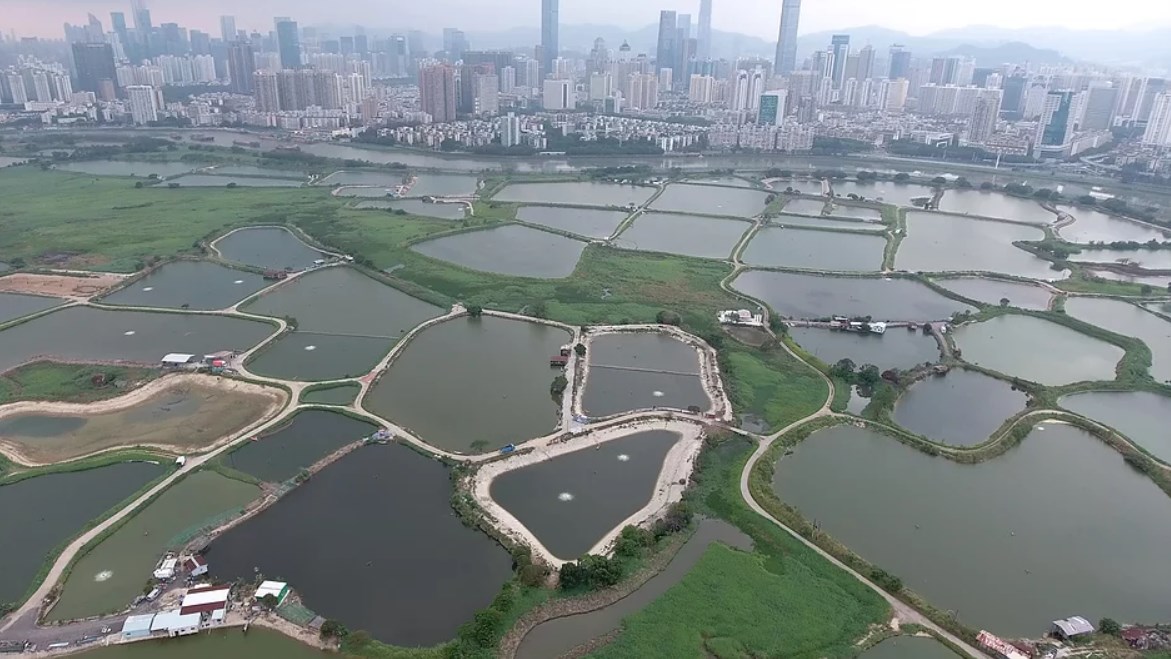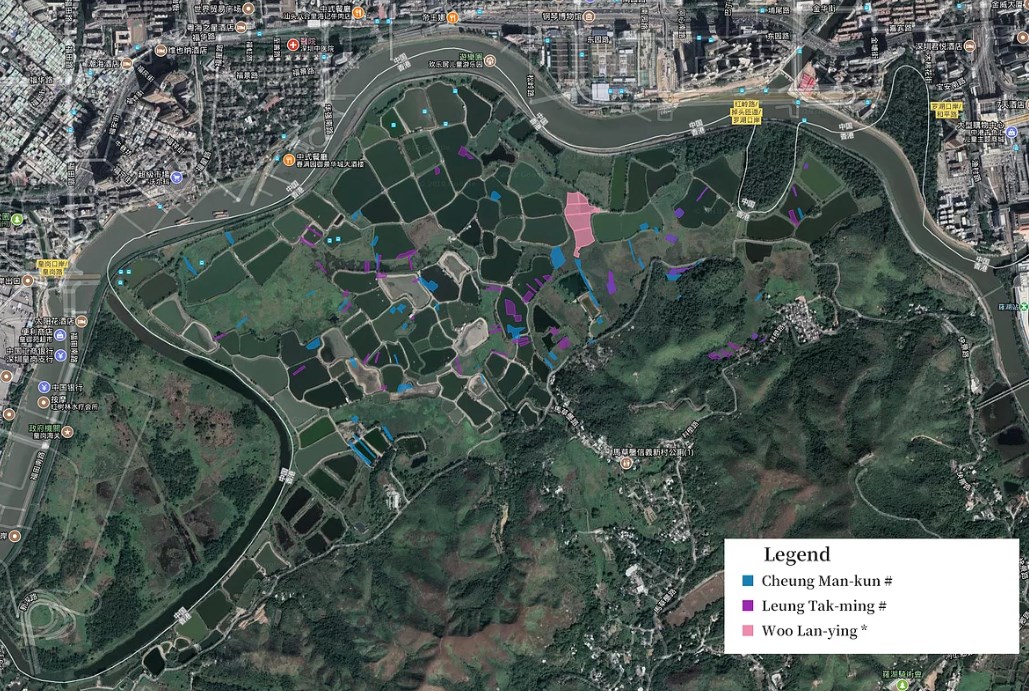Following years of dispute over who owns the 87-hectare Lok Ma Chau Loop on the Hong Kong-Shenzhen border, the two governments announced last year that they would jointly develop the land into an innovation and technology park four times the size of Science Park in Shatin. With $20bn earmarked for the first phase of the project, construction work is poised to begin.
Meanwhile, to the northeast lies Hoo Hok Wai, a 228-hectare conservation area which falls within one of 12 priority sites for enhanced conservation. It is also where globally endangered species including the black-faced spoonbill and Eurasian otter call home.
Isolated in the Frontier Closed Area until the border zone was relaxed in 2012, a large stretch of fishponds, streams and marshy wetland lain untouched for decades. The skyscrapers of Shenzhen across the border loom incongruously over a vibrant habitat.

However, an investigation by FactWire reveals that at least ten groups of obscure local and mainland investors, some hidden behind sham directors and secretive offshore companies, have quietly splashed at least $470m to buy up one-third of all land lots in the protected area over the last ten years, despite environment restrictions that limit the prospect for development.
Land grabs fueled by this influx of capital spawn serious concerns over the fate of wetlands surrounding the Lok Ma Chau Loop project. The opacity of some of the offshore dealings also raises questions about the real identities of the investors.

According to Land Registry records, the largest landowner in Hoo Hok Wai is a group of people closely related to Lung Fung Group, a pharmacy chain mainly operating in the northern New Territories. Since 2016, five individuals including relatives of Tse Siu-hoi, the owner of Lung Fung, and the company’s former and current executives, have amassed 234 parcels of land for $72m through 15 Hong Kong companies, all established between 2016 and 2017, and each was held by one of five different entities registered on the same address in the British Virgin Island (BVI).
All purchases were also made through the same secretarial company and law firm.

Offshore structures
One major stakeholder in these deals is Eugene Chan Ming-shui, the company director of Lung Fung Pharmaceutical (Group) Ltd. In a year since November 2016, he purchased 77 plots for $19m through four different Hong Kong companies called Power Capital Investment, Good Smart Asia Pacific, United Bright Capital Investment and Top Smart Properties. All of them only have one issued share which is held by the BVI firm Big Wheel Global.
Shocked by the size of his holdings, Chan told FactWire that he had already left Lung Fung since early this year and was only holding the plots at the request of the company. He said: “The manager asked me to become the director of some companies and said they would cancel my name after buying some land. I did not know I have 77 plots until you told me.”
Chan, who had worked for Lung Fung for more than 20 years, added that he only managed the company’s warehouses and knew very little about how to open a company or buy land.
Another 205 plots were acquired by in-laws of Tse, including Chan Yuen-yi, Chan Wai-kong and Chan Wai-lung, for $70m through 13 companies, each controlled by a BVI entity.
Wai-lung, who manages Lung Fung’s branches in Yuen Long, said he knew nothing about the land he owned in Hoo Hok Wai.
Tse is also believed to own four other plots purchased by two other companies. Although he is not listed as their director, his signature appears in some land sale agreements. Tse did
not respond to requests for comment.
In Hoo Hok Wai, it is also typical for investors to acquire land directly through an offshore company in order to mask their real identities. FactWire has identified three individuals who, as nominee directors, purchased a total of 101 land lots for $58m through 14 offshore companies between 2011 and 2015. It remains unclear who the real owners are.
Among them is Cheung Man-kun, who purchased 54 plots for $17m in 2011 via seven BVI companies of which he is listed as director. Cheung is a seasoned land buyer according to transaction data. In 2012, he acquired another 50 lots in Sai Kung through a company called Hong Kong Sai Kung Ngong Wo Resort Development, which he partly owned, until he sold his share the next year to a Chinese company registered in Zhuhai.
Another buyer is Woo Lan-Ying, who bought five contiguous parcels in east Hoo Hok Wai in 2015 through three entities incorporated in the Seychelles. All three companies were wholly-owned subsidiaries of Hong Kong-listed engineering firm KSL Holdings, until it sold them as well as the land lots they held to another Seychelles company called Triumphant Day. The announcement specifically states that the plots are “planned to be leased for agricultural use.”
A businessman with the same name as Cheung is one of the largest shareholders of the listed investment firm China Financial Leasing, which holds a stake in KSL.

* As directors of companies incorporated in the Seychelles
Another businessman Leung Tak-ming, who owns a company that produces uniforms and gear for law enforcement units including the Hong Kong police, bought 52 land lots for $24m in 2013 through four BVI entities. He told FactWire that he immediately resigned from the offshore companies after the deals were done, but insisted he could not remember whom he bought the land for.
Among the 802 land lots that FactWire has looked into, as many as 335 plots were purchased directly or indirectly through offshore companies. All of the land these two groups of buyers bought are incongruous and scattered over Hoo Hok Wai. In some plots, they would share the ownership with one another.
Chinese money
Investors from mainland China are also among the major buyers in Hoo Hok Wai, including Su Zhensheng, a Shenzhen committee member of the political advisory body Chinese People’s Political Consultative Conference (CPPCC). Either in his name or through companies he owned, Su snapped up a total of 42 plots for $20m in 2009. As the owner of a Shenzhen-based company, he is also a committee member of an obscure business body known as ‘the Homocentric Club of Shenzhen’, which counts Pony Ma, founder of the Chinese internet giant Tencent, among its senior members.
Another major investor is Ding Furu, a multimillionaire and chairman of Shanghai-based property developer New Development Group, which is currently building the tallest skyscraper in New Zealand. In 2011 through his Hong Kong company Asia Pacific Group International, he spent $113m to acquire a 7.6 hectare land lot – the largest plot in Hoo Hok Wai.
According to a planning document released a year before Ding’s acquisition, his plot falls in an area where the government plans to build an underpass connecting the technology park in the Lok Ma Chau Loop to the city.

+ In their own name or via companies they own
The latest scores of transactions came from another mainland businessman named Wei Changxu, who scooped up 41 plots for $26m in just a month since February this year. The deals were made through a Hong Kong company called Fortune Happiness International Investment Holding co-owned by Wei and a Hong Kong shareholder.
Unlikely burgeoning market
After the pharmacy company Lung Fung and Chinese tycoon Ding, the third largest landowner in Hoo Hok Wai is a little-known company called Smart Plan Investment, which has amassed 134 land lots, totalling 7.55 hectares, since 2008. One of its shareholders, Cheng Kwee, was a former independent non-executive director of Chinese Estates, a major Hong Kong property developer.
Other buyers in the area include a company called City Capital Development, which bought 28 plots for $13m in late 2016. It is owned by Hong Kong-listed warehouse operator Safety Godown and also lists Wayne Lu Wing-yee, the executive director of the latter, as director. Some smaller buyers include Tang kwok-wai, Tang Chik-leung, Choi Chi-keung, who bought one-fifth of ownership in 38 land lots for $7m in 2017.

This land rush in Hoo Hok Wai has pushed land prices in the area to new highs. Since 2009, the average price has increased from $90 per sq ft to $130 early this year, although it is still dwarfed by recent sales in other conservative areas in Lok Ma Chau, which recorded an average price of $247 per sq ft.
This is nevertheless an unlikely land boom for a remote wetland. According to the outline zoning plan for Ma Tso Lung and Hoo Hok Wai, permitted land uses in the conservative area include fish ponds, nature reserves, nature trails, on-farm domestic structures, wetland, and wild animal protection area. The planning intention is to conserve the ecological value of the wetland and fish ponds in line with a so-called “no-net-loss in wetland” principle, which is also adopted in Mai Po and Nam Sang Wai.
The document also states that the government “discourages new development unless it is required to support the conservation of the ecological integrity of the wetland ecosystem or the development is an essential infrastructure project with overriding public interest.” Any diversion of streams, filling or excavation work in the area also requires permission from the Town Planning Board.

An ecological field survey conducted in 2013 also found that the fish ponds and freshwater marshes in Hoo Hok Wai “have high ecological value due to their importance to waterbirds, including ardeids and spoonbills and other wetland-dependent species, including Eurasian Otter, and their strong ecological linkages with other wetlands within the Deep Bay Area, including the Mai Po Inner Deep Bay Ramsar Site.”
“Different ponds are used preferentially by birds in different seasons, and it would be difficult to justify removal of certain individual fish ponds,” the study concluded.
